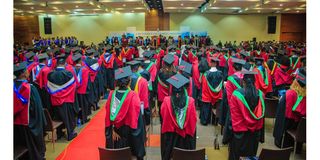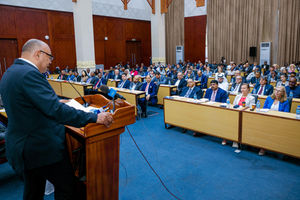EAC out to improve graduate employability in the region

What you need to know:
- Over 60 percent of the population in the EAC is under 35, with many in this group facing unemployment.
Arusha. The East African Community (EAC) is working out a plan that will improve youth employability in the region.
Representing the EAC Secretary-General, Ms Veronica Nduva, the Principal Political Affairs Officer of the EAC, Mr David Onen, said yesterday that the move seeks to tame a worrying trend of high unemployment rates among graduate youths in East Africa.
“Over 60 percent of the total population in the EAC is under the age of 35, and among them are many who are unemployed….it is a serious threat to the political stability, development and economic prosperity of the entire region,” he said during the ongoing 8th Youth Conference dubbed ‘Youlead’.
He told over 300 young people participants from various African countries that the EAC has identified the lack of skills in key sectors as the main cause for youth unemployment.
As such, the EAC has put in place regional educational leadership policies that include strengthening the capacity of the Inter-University Council for East Africa (IUCEA), harmonizing curricula, exams, certificates and accreditation institutions,” she said, adding:
“Other efforts include initiating and supporting scientific and technological research to identify and develop centres of excellence within the region, as well as providing educational funding through various EAC scholarship programmes because we recognize the critical importance of education, science, and technology in driving economic development,” he said.
This comes at a time when a recent study by the IUCEA shows that over 50 percent of university graduates from East African countries have been unable to secure employment due to a lack of adequate skills in key sectors, especially in services, communication, technology, and vocational trades.
According to the IUCEA study on the preparedness of university graduates to enter the job market, with the skills gap, 51 percent, 55 percent, 52 percent, 61 percent and 63 percent of graduates in Kenya, Burundi, Rwanda, Tanzania and Uganda respectively are unemployed.
According to Mr Onen, the EAC intends to assess to what extent existing policies and the current environment were fostering the skills and expertise that align with the needs and expectations of young people.
The EAC will also explore steps to improve the quality and accessibility of education across Africa, so that young people in East Africa can become champions of the development, technological, and economic advancement that Africa desires.
Earlier in the forum, the European Union Ambassador to Tanzania, Ms Christine Grau, said that the European Union was ready to support any efforts by young people aimed at fostering development in their communities and countries as a whole.
“There are many economic and social changes taking place, and that’s why we need young people like you to bring energy, ideas, and motivation. For us, in the European Union and our member states, working with youth is not an option; it’s a necessity, and we are committed to it because your innovative approaches and passion are crucial for the sustainable development of our societies,” she said.



